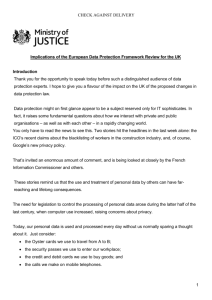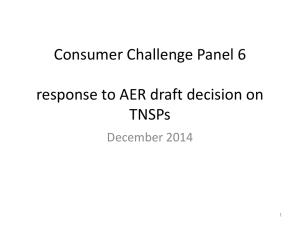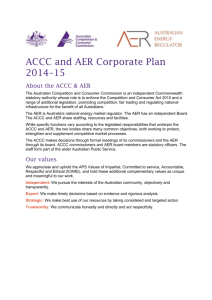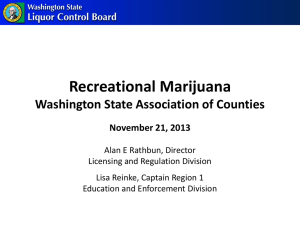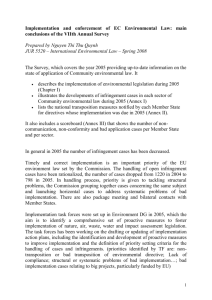Compliance and Enforcement Statement of Approach
advertisement
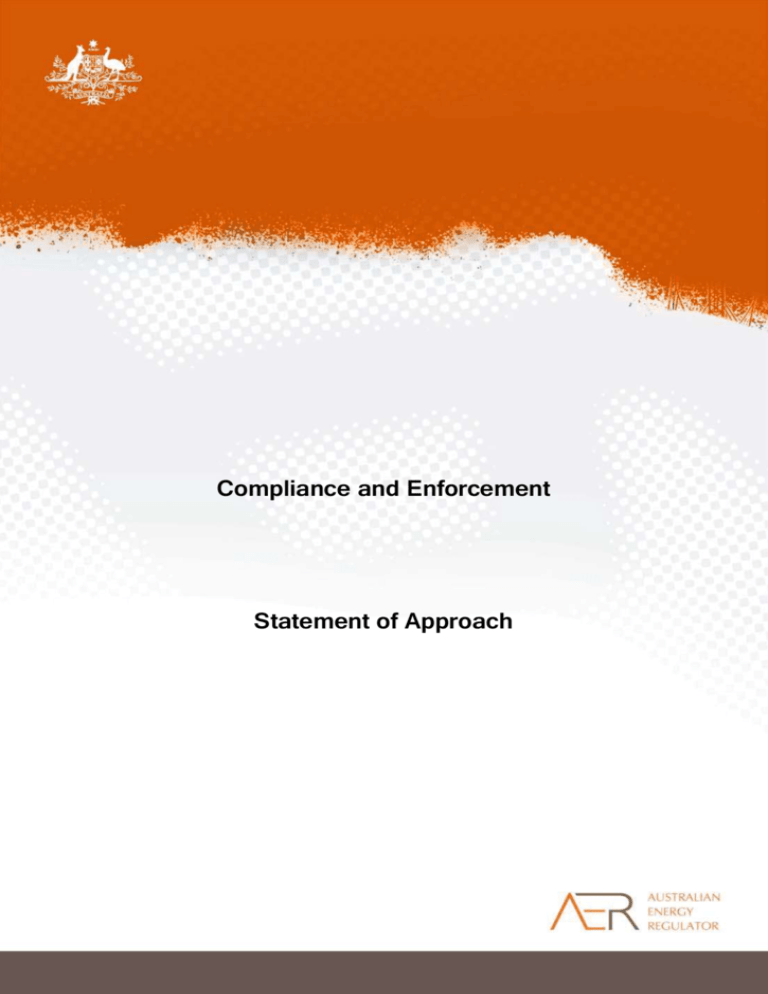
Compliance and Enforcement Statement of Approach i April 2014 © Commonwealth of Australia 2014 This work is copyright. Apart from any use permitted by the Copyright Act 1968, no part may be reproduced without permission of the Australian Competition and Consumer Commission. Requests and inquiries concerning reproduction and rights should be addressed to the Director Publishing, Australian Competition and Consumer Commission, GPO Box 3131, Canberra ACT 2601. Inquiries about this report should be addressed to: Australian Energy Regulator GPO Box 520 Melbourne Vic 3001 Tel: (03) 9290 1444 Fax: (03) 9290 1457 Email: AERInquiry@aer.gov.au AER reference: 53249-D14/32486 ii Contents 1 2 Introduction ........................................................................................................... 4 1.1 AER functions and powers .................................................................................... 4 1.2 Risk Assessment ................................................................................................... 5 1.3 Culture of compliance ............................................................................................ 6 1.4 Cooperation with the ACCC .................................................................................. 6 Information gathering and monitoring .................................................................. 8 2.1 Analysis of market intelligence.............................................................................. 8 2.2 Market Monitoring .................................................................................................. 8 2.3 Targeted compliance reviews and strategic compliance projects ....................... 9 2.4 Reporting Obligations ............................................................................................ 9 2.5 Audits...................................................................................................................... 9 3 Investigations and inquiries ................................................................................ 11 4 Enforcement ........................................................................................................ 12 4.1 Objectives of enforcement................................................................................... 12 4.2 Factors for enforcement action ........................................................................... 12 4.3 Enforcement options ............................................................................................ 13 5 Reports on compliance and enforcement activities ............................................ 18 3 1 Introduction The Australian Energy Regulator (AER) is Australia’s national energy market regulator. Among other functions, the AER is responsible for monitoring, investigating and enforcing compliance with obligations under the National Electricity Law, National Gas Law, National Energy Retail Law 1 and the respective Rules and Regulations (national energy laws2). This Statement of Approach explains our approach to monitoring compliance, how we respond to potential breaches, and the factors we may have regard to when deciding whether to take enforcement action. Our aim is to see businesses achieve high levels of compliance with the national energy laws.3 We seek to demonstrate proportionality and procedural fairness (where required) in our enforcement actions. 1.1 AER functions and powers The national energy laws give the AER powers to monitor, investigate, enforce, and report as follows: monitor compliance with obligations under the national energy laws (refer to section 2 of this document) investigate and make inquiries regarding breaches or possible breaches of the national energy laws (refer section 3). This includes powers to: 1 obtain and exercise search warrants, and compulsorily require the production of information and documents. take appropriate enforcement action (refer section 4), such as: The National Energy Retail Law (Retail Law), Rules and Regulations have been progressively implemented. At the time of publication of this document, Tasmania, the Australian Capital Territory, South Australia, New South Wales and the Commonwealth have implemented the legislation. Queensland and Victoria are expected to adopt the legislation in the future. 2 Comprising the National Electricity (South Australia) Act 1996, National Gas (South Australia) Act 2008, National Energy Retail Law (South Australia) 2011, National Electricity Rules, National Electricity (South Australia) Regulations, National Gas Rules, National Gas (South Australia) Regulations, National Energy Retail Rules and National Energy Retail Regulations. 3 In this document we generally refer to ‘businesses’, however the AER can also take enforcement action against individuals. 4 issuing infringement notices accepting voluntary or court enforceable undertakings instituting proceedings in relation to breaches of obligations under national energy laws, and revoking retailer authorisations. report on compliance with obligations under the national energy laws (refer section 5). We aim to exercise our functions and powers in a fair, consistent and transparent manner. 1.2 Risk Assessment We undertake a risk assessment of each obligation in the national energy laws to assist us to target and prioritise our monitoring and compliance activities. The risk assessment involves an analysis and ranking of each obligation to determine its compliance risk, based on two criteria: the impact on businesses, consumers and other stakeholders of a breach of the obligation, and the probability that a breach would occur. In assessing the impact of breaches, we draw on the objectives of the national energy laws, that is: to promote efficient investment in and efficient operation and use of energy services for the long term interests of consumers with respect to price, quality, safety, reliability and security of supply of energy .4 For example, some obligations, if breached, may cause significant detriment to consumers or third party businesses, while a breach of others may undermine confidence in energy markets, with longer term impacts on investment and the efficiency of the market. While all obligations in the national energy laws are subject to our compliance monitoring activities, we pay particular attention to provisions which are assessed as having a significant impact on the relevant national energy laws objective and which are more likely to be breached. Such provisions are more likely to be subject to vigorous and intensive monitoring. For example, provisions which ensure that customers have 4 Section 7 National Electricity Law, section 23 National Gas Law and section 13 National Energy Retail Law. 5 access to essential energy services or those which play an important role in ensuring the security and reliability of the power system. Other factors, such as industry information, also assist us to prioritise our activities. Our approach is dynamic, flexible and regularly reviewed in response to new information to ensure it remains up to date and relevant. 1.3 Culture of compliance We consider that a culture of compliance is critical to the achievement of the national energy laws objective and to build consumer confidence in energy markets. The prevention of contraventions of obligations under the national energy laws is preferable to the AER taking enforcement action after a breach has occurred. Through our work we seek to encourage a culture of compliance. We aim to educate and inform businesses about obligations under the national energy laws by publishing documents (for example compliance bulletins and reports, investigation reports, performance reports, market reports, and this Statement of Approach), attending industry forums and actively engaging with stakeholders. Ultimately, responsibility rests with businesses to meet their obligations under the national energy laws. We encourage businesses to continuously review the effectiveness of their compliance policies, systems and procedures to ensure that they are complying with their obligations. 1.4 Cooperation with the ACCC The AER and the ACCC work together to ensure that misconduct in the energy market is addressed. We seek to avoid duplication and ensure wherever possible that we apply a consistent and coordinated approach. Businesses operating under the Retail Law also have obligations under the Australian Consumer Law (ACL) that apply to their relationships with energy customers, including obligations relating to unsolicited consumer agreements. The ACL and the Retail Law and Rules operate together, providing the framework in which these businesses are required to operate. 6 We also observe the ACCC and AER Information Policy5 which provides guidelines on the collection, use and disclosure of information between the two agencies. Information (including confidential information) collected by the ACCC may be used by the AER and vice versa. In general, the AER and ACCC will not accept conditions proposed by a business that seek to limit the use of information to a particular matter. 5 Available on the AER website. 7 2 Information gathering and monitoring Information gathering and market monitoring allow us to assess levels of compliance and identify potential breaches of the national energy laws. We have a wide range of information sources and monitoring tools within the network, wholesale and retail energy markets. We can escalate any identified potential breaches for further inquiry or investigation. While we assess all complaints and breaches and record them in our systems, we cannot pursue enforcement action in all cases. All matters are carefully considered, but we focus our enforcement activities on breaches where there is a high impact (or risk of impact) to consumers or the market more generally. Some of the mechanisms for information gathering and monitoring we use are discussed below. 2.1 Analysis of market intelligence We may use information received from stakeholders (including consumers, 6 businesses, energy ombudsman schemes, government agencies and consumer groups 7) to identify issues that warrant further inquiry or investigation as they may have a material impact on customers or be of concern to the wider market. 2.2 Market Monitoring We continuously monitor activity in the electricity and gas wholesale markets, including bidding and rebidding, dispatch and prices, network constraints and outages, and forecasts of demand, production and capacity. We publish weekly reports on these markets and significant price variation and high price event reports. 6 The ACCC/AER Infocentre and the AER inquiry email provide a service for customers and other interested parties to complain about the conduct of energy related businesses. We record the nature and subject matter of all correspondence and monitor these records to identify trends or patterns that may suggest underlying compliance issues. 7 We established a Customer Consultative Group to advise on issues affecting energy customers and provide advice on any emerging issues the group considers we should direct our attention to. 8 We also monitor businesses in other ways, such as by conducting inspections of businesses’ websites which may highlight potential areas of concern that may warrant further investigation.8 2.3 Targeted compliance reviews and strategic compliance projects We regularly conduct targeted compliance reviews of provisions of the national energy laws. These reviews usually involve writing to businesses to request information on their compliance with a particular obligation or group of related obligations. This can include looking at the policies, systems and procedures that businesses have in place to meet the targeted obligations. We also undertake strategic compliance projects, which involve identifying a particular compliance problem, inefficiency, harm or risk within the energy markets and working toward solving the issue or reducing its severity or likelihood of occurring. Most of these projects have a tailored metric which assists in measuring the AER’s and industry’s success. 2.4 Reporting Obligations Some businesses are subject to specific reporting requirements. For example, guidelines developed under the Retail Law impose an obligation on certain businesses to identify breaches and report them to us within a specified period.9 The additional information we receive assists us to monitor compliance with national energy laws. 2.5 Audits We undertake audits to assess how businesses manage compliance with specific obligations of the national energy laws. Audits may arise as a result of observed patterns or trends in the market that suggest a breach or possible breach, or in response to particular conduct of a business. 8 In the retail sector this includes reviewing specific information regulated entities are required to publish on their websites including prices, contracts, hardship policies and dispute resolution procedures. Our Compliance Procedures and Guidelines are made under section 281 of the Retail Law. 9 9 The audits generally focus on whether appropriate and functioning internal controls are in place for identifying, monitoring and ensuring compliance, identifying breaches or possible breaches and reporting and correcting any such breaches. The scope and audit approach will vary depending on the nature of the business and the issues being audited. The audits can be run internally by AER staff or external auditors may be used. We acknowledge that audits can be intrusive and costly. 10 We therefore consider the scope, coverage and timing of audits on a case by case basis. 10 Where an audit is carried out by or on behalf of the AER, section 278 of the National Energy Retail Law allows the AER to recover the costs of the audit from the relevant participant. 10 3 Investigations and inquiries Where our monitoring activities identify breaches or possible breaches of obligations under the national energy laws, we assess the matter to determine whether we need to undertake further inquiries and/or commence an investigation. If we require further information or supporting documents regarding an event, we usually seek these from businesses on a voluntary basis in the first instance. However, where necessary we can use statutory information gathering powers.11 These powers allow us to obtain search warrants and to compel the production of information and documents that are relevant to our compliance and enforcement functions. Under the national energy laws, penalties apply where a person fails to comply with a notice to provide information and documents. Where appropriate, we will engage with businesses throughout an investigation. We may also seek and share information with the ACCC, the Australian Energy Market Operator (AEMO) and other agencies as part of our investigation process. 12 11 Sections 21 and 28 National Electricity Law; sections 35 and 42 National Gas Law and sections 206 and 309 of the National Energy Retail Law. 12 See section 1.4 above and as permitted by the Competition and Consumer Law 2010 (Cth). 11 4 Enforcement We aim to pursue appropriate enforcement responses to breaches of the national energy laws. This section considers our objectives in taking enforcement action, the factors we take into account in deciding an appropriate enforcement response and an overview of our enforcement options. 4.1 Objectives of enforcement In taking enforcement action we aim to: ensure that the offending conduct stops correct any damage that the breach has caused prevent the same conduct from recurring deter other entities from engaging in offending conduct clarify the operation of the national energy laws, and penalise offenders, where warranted. 4.2 Factors for enforcement action We have discretion in deciding whether to take enforcement action and the nature of that action. We assess each case on its merits. In determining an appropriate enforcement response we consider all relevant circumstances which may include: the nature and extent of the conduct that forms the breach, including the period over which the conduct extended and the number of related breaches the impact of the conduct, including harm or detriment to consumers (particularly disadvantaged or vulnerable consumers) and other parties, and/or an increased risk of serious harm or detriment in future whether the conduct was deliberate or avoidable had reasonable compliance practices been followed by the business 12 whether the conduct involved, or was directed/overseen by, senior management the extent of any realised or potential future financial gain from the conduct (including compliance costs avoided by the business) whether action is already being taken to address the issue by another enforcement agency or other organisation the business’s own actions in relation to the conduct, including whether the conduct was self-reported, the level of cooperation with the AER, and any action taken to rectify the breach and avoid reoccurrence, and whether the business has a corporate culture conducive to compliance, including the effectiveness of compliance programs, and whether corrective measures have been taken in response to past breaches. 4.3 Enforcement options We have two enforcement responses available to us which can be broadly categorised as: administrative statutory. 4.3.1 Administrative action Administrative resolutions are a more informal and less intrusive enforcement option which we use to resolve many matters. We are more likely to act administratively where the effect of an actual or potential contravention is limited, and the business has taken (or agreed to take) appropriate steps to end the conduct and to remedy any harm done. A decision by the AER to resolve a matter administratively does not indicate acceptance or approval of the conduct, nor does it remove a business’s responsibility for the breach. In each case we reserve the right to take statutory enforcement action in the event that information on which we based our initial assessment is subsequently found to have been incomplete, inaccurate or misleading or if the administrative action proves to be ineffective. 13 Administrative resolutions may include voluntary commitments to rectify non-compliance by implementing a compliance program, improving internal operational procedures or conducting staff training. We have no legal power to enforce voluntary commitments, but as noted above, we do reserve the right to take statutory action. 4.3.2 Statutory enforcement action The statutory enforcement regime includes a number of powers that enable us to enforce the national energy laws including powers to: issue infringement notices accept court enforceable undertakings initiate court proceedings, and revoke a retailer authorisation and impose a consequent prohibition from selling energy in any participating jurisdiction.13 Infringement notices If the AER has reason to believe that a civil penalty provision has been breached, we have the power to issue infringement notices.14 This must be done not later than 12 months after the date on which the AER formed its reason to believe. The penalty payable under an infringement notice is currently $4 000 for a natural person or $20 000 for a body corporate. Infringement notices give the recipient the option of paying a penalty in full or electing to have the matter heard in court. Payment of an infringement notice does not require an admission of an alleged breach or represent acceptance of liability in respect of an alleged breach. Failure to pay the penalty under an infringement notice is likely to result in litigation. 13 This power applies only to the retail energy sector. 14 Section 308 National Energy Retail Law, section 74 Electricity Law and section 277 Gas Law. 14 Once an infringement notice is issued, we cannot separately initiate court proceedings in relation to the act or omission that is the subject of the notice, unless we revoke the infringement notice within a specified period or the recipient fails to comply with the notice. We can, however, take further action if the breach reoccurs after the payment of the infringement notice. Court enforceable undertakings We may accept a formal commitment (undertaking) in writing from a business in connection with any matter for which we have a function or power under the national energy laws.15 Enforceable undertakings are given voluntarily. We cannot compel a business to give an enforceable undertaking, nor are we required to accept an undertaking proffered by a business. Enforceable undertakings can provide tailored solutions to address conduct that has given rise to the alleged breach. For example, an enforceable undertaking might include commitments to stop the behaviour that led to the breach, take action to remedy the breach or introduce measures to help prevent future breaches of that nature. If we consider that a business has not complied with an enforceable undertaking we can seek orders from the court including declarations of a breach or injunctions preventing further conduct. If the court finds an undertaking has been breached, it can make any or all of the following orders: an order directing the person to comply with enforceable undertaking an order directing the person to pay the Commonwealth an amount up to any financial benefit that the person obtained directly or indirectly and that is reasonably attributable to the breach an order directing that person to compensate any other person who has suffered loss or damage as a result of the breach, and 15 any other order that it considers appropriate. Section 288 National Energy Retail Law, section 59A National Electricity Law and section 230A National Gas Law. 15 Civil proceedings We can initiate civil proceedings for alleged breaches of civil penalty provisions of the national energy laws.16 Proceedings may only be instituted within six years of the date on which an alleged breach occurred. Civil proceedings are more likely to be initiated in cases where the conduct: resulted in significant detriment demonstrated a blatant, ongoing or serious disregard for the law is widespread, such that enforcement action is likely to have a significant deterrent effect is that of a person, business or sector that has a history of previous breaches of energy laws is of significant public interest or concern, or involves a new or emerging market issue. On application by the AER, if the court finds that there has been a breach of a civil penalty provision it can make a range of orders including one or more of the following: a declaration that a person is in breach of the provision an order that a person pay a civil penalty an order that a person take such action as the court requires for remedying the breach or preventing its recurrence an order that the person implement a specified compliance program, and an order for an injunction restraining the person from engaging in the conduct or requiring the person to take some positive action in relation to the conduct. 16 Section 59 National Electricity Law, section 229 National Gas Law and section 289 National Energy Retail Law. 16 The national energy laws set out the factors which the court must have regard to in determining the value of a civil penalty to be paid, including:17 the nature and extent of the breach the nature and extent of any loss or damage suffered as a result of the breach the circumstances in which the breach took place whether the person has engaged in any similar conduct and been found to be in breach of a provision of the national energy laws in respect of that conduct, and if appropriate, whether the person has established and complied with, policies, systems and procedures required under national energy laws. Revocation of retailer authorisation We have powers under the Retail Law to revoke a retailer authorisation if we are satisfied that there has been a material failure by a retailer to meet its Retail Law obligations, and there is a reasonable apprehension that the retailer will not be able to meet its obligations in the future. Revoking a retailer authorisation prohibits a retailer from selling energy in any participating jurisdiction. We are required to provide reasons for any revocation.18 We give the retailer an opportunity to demonstrate why its authorisation should not be revoked and to present a proposal to address our concerns.19 17 Section 64 National Electricity Law, section 234 National Gas Law and section 294 National Energy Retail Law. 18 Section 120(3) National Energy Retail Law. 19 Section 120(4) National Energy Retail Law. 17 5 Reports on compliance and enforcement activities As noted in section 1.3 of this Statement of Approach, subject to confidentiality, we may report on the outcomes of our monitoring, enforcement and investigation activities. By publishing this information we seek to educate and inform businesses, customers and other stakeholders by highlighting compliance issues and/or raising awareness of obligations. If we consider publication appropriate, we may distribute information via various reports including investigation reports and compliance bulletins/reports. These reports may include details of relevant incidents, the main findings, reasoning behind those findings, and outcomes. We also have statutory obligations to report annually on some of our compliance activities. We will ensure that businesses are consulted where a report on an investigation is likely to include information that has been provided by them in confidence. 18

